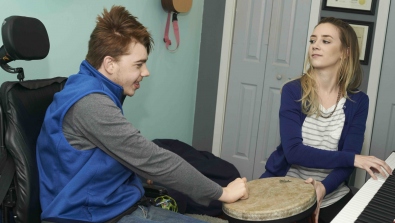The phrase “Music Therapy” can be misleading and confusing. You may think of something esoteric or just recreational.
Many people picture someone with a guitar leading a group in “Kumbayah” around a campfire. The phrase gets used incorrectly sometimes too, so we will tell you our official definition here!
Music Therapy is the clinical and evidenced-based use of music interventions to accomplish functional goals. This means that board certified, highly trained music therapists use research, experience, and specialized education to tailor music exercises to the individualized non-musical needs of a client. It is an allied healthcare practice that can serve as a great complementary therapy to speech therapy, occupational therapy, physical therapy, and psychotherapy to reach goals faster. It’s also a great stand-alone therapy modality for people who haven’t seen any progress in other standard types of therapy.
Even though Music Therapy has been an established field for many years, it isn’t as well known as other types of therapy. But professionals have been conducting research about how music can help people in medical and health settings since the 1700s, and there is a large amount of evidence for the efficacy of music therapy!
Music Therapy can serve people from all ability levels, age groups, and diagnoses. Music Therapists can be found working in various types of settings and facilities, including hospitals, schools, nursing homes, mental health treatment centers, early intervention programs, and private practice settings like ours. Board certified music therapists work with diverse populations and various diagnoses, including but not limited to those with autism spectrum disorder, ADD and ADHD, psychiatric or behavioral disorders, physical disabilities, developmental disabilities, and more.
At So.i.Heard, our highly skilled music therapists are committed to guiding clients of all abilities toward positive change. That means something different to each individual, and we use our training and fine-tuned intuition to adapt to each person in each session. We provide free consultations, so come to the studio to meet us and ask any other questions you may have!
What to Expect of a Music Therapy Session
The music therapist will assess the client and determine non-musical goals to work toward, which can include improving expressive and comprehensive communication skills, fine and gross motor skills, cognitive skills, self-expression, as well as managing behavioral issues.
Once the Music Therapist has assessed the client, they will determine what music interventions and protocols can be used to help reach these goals. Examples of a short-term objectives can include:
- Attending to an instrument for a determined amount of time without distraction – cognitive skill
- Grasping the mallet with one hand to play the drum – fine motor skill
- Singing improvised lyrics to an improvised song – cognitive and social skill
- Playing the hand drum with both hands in rhythm – gross motor skill
- Responding with the correct song lyric when cued – communication skill
Many sessions begin with a hello song, and end with a goodbye song. The purpose of this to is help clients transition into the session, as well as transitioning back out of music and into the rest of their day. Oftentimes clients with special needs need time to adjust when they enter a new setting or situation. A “hello song” offers them an orienting introduction into the session, while the “goodbye song” offers closure and preparation time for clients.
Every client has different individualized needs, and every day presents different challenges for each person. Therefore, music therapists are trained and experienced in flexibly prioritizing and meeting needs in the moment, whatever they may be. Because the music therapist aims to help the clients succeed at every stage, each session will look completely different.



